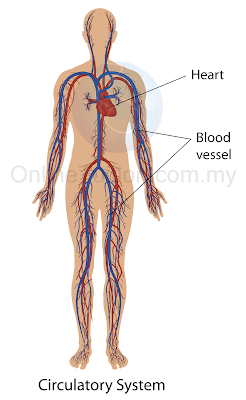- Different organ work together form an organ system.
- The human body has eleven different organ system, namely the
- Circulatory System
- Digestive System
- Reproductive System
- Endocrine System
- Nervous System
- Respiratory System
- Muscular System
- Skeletal System
- Excretory System
- Lymphatic System (Immune System)
- Integumentary System
Circulatory System
Organ: Heart, Blood Vessel
Function: Transport nutrients, gases and wastes to and from cells, helps fight diseases and helps stabilize body temperature and pH to maintain homeostasis.
Digestive System
Organ: Mouth, Oesophagus, Stomach, Duodenum, Small Intestine, Large Intestine
Function: Breaks down food in the body, into a form that can be absorbed.
Reproductive System
Organ: Males: Testes, penis; Females: Ovaries, uterus, vagina
Function: Reproduce offspring.
Endocrine System
Organ: Pituitary, Thyroid, Adrenal gland, Pancreas, Ovary (female only), testis (male only)
Function: Secrets hormone. Hormones are chemical that play a role in regulating metabolism, growth, development and puberty, and also plays a part in determining mood.
Nervous System
Organ: Brain, Spinal Cord, Peripheral Nerves, Sense Organs
Function: Conduct impulses the the body, spinal cord and brain.
Respiratory System
Organ: Nose, Trachea, Lungs
Function: Allow gas exchange.
Muscular System
Organ: Muscle
Function:
- Initiates heart beat.
- Working with the skeletal system in movement and locomotion.
Skeletal System
Organ: Bones, Tendons, Ligaments, Cartilage
Function:
- Supports the body.
- Protects the internal organ.
- Make red and white blood cells.
- Plays important role in movement.
Excretory System
Organ: Kidneys, Skin, Lung
Function: Eliminates the waste products of metabolism.
Lymphatic System (Immune System)
Organ: Lymphatic Nodes, Lymphatic Vessels, Spleen, Thymus Galnd
Function:
- Remove the interstitial fluid from tissues.
- Absorbs and transports fatty acids and fats to the circulatory system.
- Produces immune cells.
Integumentary System
Organ: Skin
Function: Protects the body from damage,









